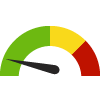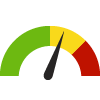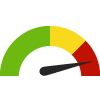Indicator Gauge Icon Legend
Legend Colors
Red is bad, green is good, blue is not statistically different/neutral.
Compared to Distribution
 the value is in the best half of communities.
the value is in the best half of communities.
 the value is in the 2nd worst quarter of communities.
the value is in the 2nd worst quarter of communities.
 the value is in the worst quarter of communities.
the value is in the worst quarter of communities.
Compared to Target
 meets target;
meets target;  does not meet target.
does not meet target.
Compared to a Single Value
 lower than the comparison value;
lower than the comparison value;
 higher than the comparison value;
higher than the comparison value;
 not statistically different from comparison value.
not statistically different from comparison value.
Trend

 non-significant change over time;
non-significant change over time; 
 significant change over time;
significant change over time;  no change over time.
no change over time.
Compared to Prior Value
 higher than the previous measurement period;
higher than the previous measurement period;
 lower than the previous measurement period;
lower than the previous measurement period;
 no statistically different change from previous measurement period.
no statistically different change from previous measurement period.
 Significantly better than the overall value
Significantly better than the overall value
 Significantly worse than the overall value
Significantly worse than the overall value
 No significant difference with the overall value
No significant difference with the overall value
 No data on significance available
No data on significance available
Adults with Likely Serious Psychological Distress
This indicator is archived and is no longer being updated. Click to learn more
Why is this important?
| City/Place | Source | Measurement Period | Percent | |
|---|---|---|---|---|
Data Sources
- California Health Interview Survey
Note: This source uses Zip Code Tabulation Areas (ZCTAs) for its Zip Code data. Learn more
Maintained By: Conduent Healthy Communities Institute (Methodology)
Data source for Counties, States - California Health Interview Survey, Neighborhood Edition
Note: This source uses Zip Code Tabulation Areas (ZCTAs) for its Zip Code data. Learn more
Maintained By: Conduent Healthy Communities Institute (Methodology)
Data source for Cities/Places, Zip Codes
Note: Data for this indicator was obtained from multiple sources. Please interpret with caution as methodology may differ.
Filed under: Health / Mental Health & Mental Disorders, Health Status, Adults

